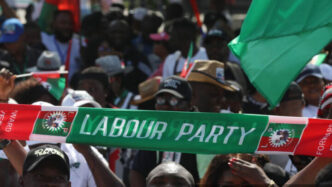The Concerned Citizens Forum says halting the naira-for-crude will negatively impact Nigeria’s economy.
On March 10, TheCable reported that the Nigerian National Petroleum Company (NNPC) Limited had reportedly suspended the naira-for-crude deal until 2030, as the government-owned company has forward-sold all its crude oil.
However, following the report, NNPC said negotiations are ongoing for a new naira-for-crude deal with Dangote Petroleum Refinery, as the current agreement will expire at the end of March.
On March 19, the Dangote refinery said it temporarily halted the sale of petroleum products in naira.
Advertisement
Speaking at a press conference, on Tuesday, Samuel Olakitan, president-general of the forum, accused the NNPCL of systemic failures.
Olakitan called on President Bola Tinubu to declare a state of emergency on the leadership of the NNPCL.
“It is with a heavy heart and a sense of urgency that we call on the Nigeria President, Bola Ahmed Tinubu, to declare a state of emergency on the leadership of NNPCL,” the forum said.
Advertisement
“We would like to elucidate the genesis and rationale of the naira-for-crude initiative. This policy was inaugurated on 1st of October, 2024. It was meticulously crafted to strengthen domestic refineries by facilitating their procurement of crude oil using the naira currency.
“This brilliant move came with the positive expectation of bolstering domestic refining capacities, attenuate our long-term dependency on imported petroleum products, and fortifying the naira by alleviating the incessant pressure on our foreign exchange reserves.
“However, despite our abundant crude oil reserves, the reality is starkly different. The NNPCL’s abrupt suspension of this visionary arrangement has created consternation and trepidation among stakeholders and the citizenry alike.
“This sudden policy reversal ostensibly compels our local refineries to procure crude oil on the international market, necessitating transactions in U.S. dollars. Such a paradigm shift is poised to escalate operational expenditures, which will invariably cascade down to the populace through inflated fuel prices at the pump.
Advertisement
“Moreover, the NNPCL’s justification for this suspension, predicated on the assertion that it has committed its crude oil production to forward contracts, ostensibly leaving no supply for domestic refineries, is both perplexing and disconcerting.
“This revelation is particularly confounding given reports indicating an uptick in Nigeria’s crude output since the inception of the naira-for-crude deal. This policy is not only absurd but also economically untenable.
“It defies logic for local refineries, which are supposed to be the backbone of Nigeria’s energy security, to be subjected to the vagaries of foreign exchange markets to access crude oil produced within our own country.”
According to the forum, the ramifications of the policy shift are profound, adding that the Dangote Refinery, a monumental $20 billion investment with a refining capacity of 650,000 barrels per day, was envisaged as the panacea to Nigeria’s protracted reliance on imported refined petroleum products.
Advertisement
“The suspension of the naira-for-crude arrangement imperils the operational viability of this refinery, potentially rendering it less competitive and undermining its capacity to ameliorate domestic fuel supply constraints,” the forum added.
“This policy volte-face is poised to exacerbate the volatility of the naira. As domestic refiners scramble to source U.S. dollars for crude procurement, the resultant surge in demand for foreign currency is likely to precipitate a depreciation of the Nigerian naira, thereby inflating the cost of imported goods and stoking the embers of inflation.
Advertisement
“The suspension of the naira-for-crude deal is undoubtedly antithetical to the overarching objective of attaining energy self-sufficiency. This policy has inadvertently perpetuated our dependency on imported petroleum products, thereby further exposing the nation to the vicissitudes of global oil price fluctuations and attendant supply chain vulnerabilities which is dangerous to our fragile economy at the moment.
“The alignment of NNPCL’s strategic priorities with national economic interests is one of the many questions emanating from the scrutiny of the underlying motivations propelling this policy shift on the NNPCL’s predilection for forward-selling crude oil, ostensibly at the expense of domestic refining imperatives.
Advertisement
“The escalation in fuel prices that may result from increased operational cost borne by domestic refiners, and the potential depreciation of the Naira, stemming from the increase in demand for foreign exchange by domestic refiners, would exacerbate the economy hardship faced by many Nigerians.
“This is unfortunate that scenario is antithetical to the President Tinubu led-administration’s avowed commitment to ameliorating the living conditions of the citizenry.”
Advertisement











